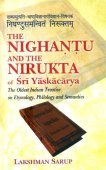Naigama: 15 definitions
Introduction:
Naigama means something in Hinduism, Sanskrit, Jainism, Prakrit, the history of ancient India. If you want to know the exact meaning, history, etymology or English translation of this term then check out the descriptions on this page. Add your comment or reference to a book if you want to contribute to this summary article.
Naigama has 13 English definitions available.
Languages of India and abroad
Sanskrit dictionary
[Deutsch Wörterbuch]
Source: Cologne Digital Sanskrit Dictionaries: Böhtlingk and Roth Grosses Petersburger WörterbuchNaigama (नैगम):—(von nigama)
1) adj. gaṇa ṛgayanādi zu [Pāṇini’s acht Bücher 4, 3, 73.] a) die vedischen Citate betreffend [Yāska’s Nirukta 1, 20.] kāṇḍa Titel der 1sten Abtheilung des [NIRUKTA], genaner des 4ten, 5ten und 6ten Buchs, wo die im 4ten Adhyāya des [NAIGHAṆṬUKA] zusammengestellten Nigama behandelt werden. — b) die heilige Schrift betreffend, darauf bezüglich, darin vorkommend, vedisch: jñāna [Bhāgavatapurāṇa 3, 7, 38.] kṛt, dhātu [Yāska’s Nirukta 2, 2.] —
2) m. a) ein Erklärer der heiligen Schriften: iti naigamāḥ [Pāṇini’s acht Bücher 5, 4, 118, Vārttika von Kātyāyana. 2.] — b) eine Upaniṣad [Hemacandra’s Anekārthasaṃgraha 3, 468.] [Medinīkoṣa Manu’s Gesetzbuch 46] (wo naigamaḥ zu lesen ist). — c) Weg, = ṛti [Hemacandra’s Anekārthasaṃgraha] [Halāyudha 5, 29.] Weg so v. a. Mittel: teṣāṃ (dasyūnāṃ) prativighātārthaṃ pravakṣyāmyatha naigamam [Mahābhārata 12, 3685.] — d) = naya [Hemacandra’s Anekārthasaṃgraha] wohl kluges Benehmen u. s. w. — e) Städter [Amarakoṣa.3,4,23,143.] [Hemacandra’s Anekārthasaṃgraha] [Medinīkoṣa] [SADDH. Pāṇini’s acht Bücher.4,25,a.] — f) Handelsmann [Amarakoṣa 2, 9, 78. 3, 4, 23, 143.] [Hemacandra’s Abhidhānacintāmaṇi 867.] [Hemacandra’s Anekārthasaṃgraha] [Medinīkoṣa] [Halāyudha 2, 416.] [Yājñavalkya’s Gesetzbuch 2, 192.] [Mahābhārata 2, 529. 4, 674.] dvijebhyo balamukhyebhyo naigamebhyaśca [13, 7709.] viprāḥ, kulanaigamāḥ [Harivaṃśa 10982.] brāhmaṇāḥ, naigamāḥ [Rāmāyaṇa 1, 77, 24. 2, 59, 21. 83, 11. 106, 33.] [Rāmāyaṇa] [Gorresio 2, 82, 11. 90, 11. 29. 6, 112, 76.] [Vikramorvaśī 76.] In den unter nigama 8 aufgeführten Beispielen bedeutet nigama viell. nicht Handelsmann, sondern Kaufmannschaft; vgl. mahati nigame naigamānām in einer grossen Versammlung von Kaufleuten [Daśakumāracarita 135, 10.] — g) Nomen proprium eines alten Lehrers [Vāyupurāṇa] in [Oxforder Handschriften 55,a,1]; vgl. [Viṣṇupurāṇa 278, Nalopākhyāna 10.]
--- OR ---
Naigama (नैगम):—
1) adj. (f. ī) b) mantrāḥ [Rāmāyaṇa 7, 34, 18.] maryādā [Lassen’s Anthologie (II) 88, 21.] —
2) a) [Bhāgavatapurāṇa 11, 18, 8. 29.] — f) [Rāmāyaṇa 7, 54, 5] (= paura [Scholiast]; vgl. e). [7, 59, 1, 2.]
Source: Cologne Digital Sanskrit Dictionaries: Sanskrit-Wörterbuch in kürzerer FassungNaigama (नैगम):——
1) Adj. (f. ī) — a) die vedischen Citate betreffend. — b) den Veda betreffend , darauf bezüglich , darin vorkommend , vedisch. —
2) m. — a) ein Veda-Erklärer. — b) *eine Upaniṣad. — c) Mittel , Weg. — d) *kluges Benehmen ( naya). — e) Städter. — f) Handelsmann. — g) Nomen proprium eines alten Lehrers.
Sanskrit, also spelled संस्कृतम् (saṃskṛtam), is an ancient language of India commonly seen as the grandmother of the Indo-European language family (even English!). Closely allied with Prakrit and Pali, Sanskrit is more exhaustive in both grammar and terms and has the most extensive collection of literature in the world, greatly surpassing its sister-languages Greek and Latin.
See also (Relevant definitions)
Starts with: Naigamabhidhana, Naigamagameya, Naigamagamika, Naigamakanda, Naigamopakhya.
Full-text: Naigamakanda, Naigamagameya, Naigamagamika, Naigamabhidhana, Negama, Janapati, Aikapadika, Naigamopakhya, Nigama-putra, Naigameya, Upakhya, Naya, Nigama, Kumara.
Relevant text
Search found 13 books and stories containing Naigama, Nai-gama; (plurals include: Naigamas, gamas). You can also click to the full overview containing English textual excerpts. Below are direct links for the most relevant articles:
Amarakoshodghatana of Kshirasvamin (study) (by A. Yamuna Devi)
Economics (1): Trade and commerce < [Chapter 3 - Social Aspects]
Yajnavalkya-smriti (Vyavaharadhyaya)—Critical study (by Kalita Nabanita)
Chapter 5.13 - Laws Relating to Transgression of Compacts < [Chapter 5 - Vyavahārādhyāya and the Modern Indian Laws]
Chapter 4.7 - Existence of the Autonomous Bodies or Groups < [Chapter 4 - The Political Aspect Reflected in the Vyavahārādhyāya]
Tattvartha Sutra (with commentary) (by Vijay K. Jain)
Verse 1.33 - Standpoints (naya) of Pramāṇa < [Chapter 1 - Right Faith and Knowledge]
Verse 9.46 - Different categories of saints (nirgrantha) < [Chapter 9 - Stoppage and Shedding of Karmas]
Verse 7.19 - Classification of votaries (vratī) < [Chapter 7 - The Five Vows]
The Shiva Purana (by J. L. Shastri)
Chapter 3 - The boyhood sports of Kārttikeya < [Section 2.4 - Rudra-saṃhitā (4): Kumāra-khaṇḍa]
Manusmriti with the Commentary of Medhatithi (by Ganganatha Jha)
Verse 2.114 < [Section XXII - Specially qualified Pupils]
Ramayana of Valmiki (by Hari Prasad Shastri)
Chapter 94 - Kusha and Lava chant the Ramayana < [Book 7 - Uttara-kanda]
Related products

